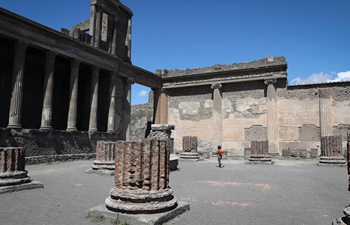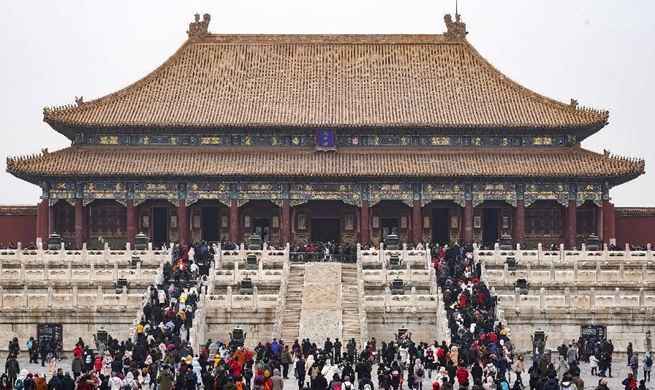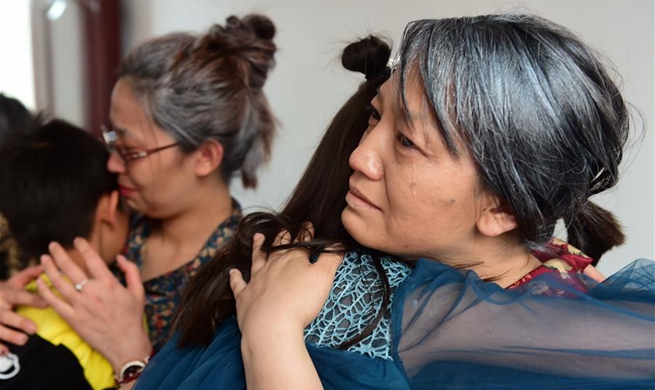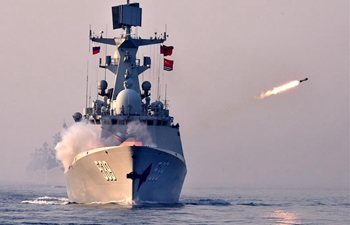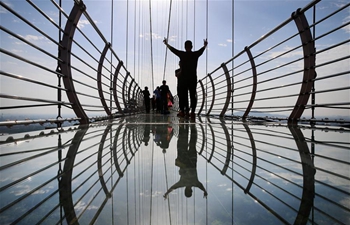ISTANBUL, May 12 (Xinhua) -- Tough times lie ahead for Turkey unless policies are readjusted as the country faces increasingly hot foreign policy issues amid an ailing economy and sharp divergences at home, analysts told Xinhua.
Political divisions appear to have become sharper after Turkey switched in 2018 to the presidential system, as tension in domestic politics has been heightened further lately when the country's top election board ordered, in a highly controversial way, a rerun of the mayoral election in Istanbul which was won narrowly by an opposition candidate.
"The rerun of the election in Istanbul will just serve to boost divergences at home," remarked Cahit Armagan Dilek, director of the Ankara-based 21st Century Turkey Institute.
The already ailing economy is sure to be adversely affected by the cancellation of the election as the government would lavishly spend to win, commented Aziz Konukman, a professor of economics with Ankara Haci Bayram Veli University.
The fresh election in Istanbul, Turkey's largest city with a population of over 15 million, is slated for June 23.
Meanwhile, the country's debt-stricken economy is suffering from high inflation, unemployment and recession.
The analysts agree that it is not possible for Ankara to successfully tackle the problems without making shifts in policy, such as taking steps aimed at decreasing the political tension at home and re-establishing dialogue with the Syrian government which Ankara sees as illegitimate.
On the foreign policy front, all indicate that the major foreign policy issues Turkey has been grappling with may reach a tipping point in the weeks ahead, with non-negligible risk of an armed clash.
The Idlib crisis in war-torn Syria, the threat of a state-like entity under the control of the U.S.-backed Kurdish militia in Syria, Ankara's dispute with Greek Cypriots over gas drilling off the divided Cyprus are among the issues expected to get hotter in the days ahead.
Turkey is in for a difficult time at home as well as on the foreign policy front in the coming months, said Yasar Yakis, a former foreign minister of Turkey.
"Turkey is surrounded from all sides by points of crisis and conflict that pose a security threat," stated Dilek, a former captain in the Turkish navy.
Ankara may turn to Washington for help to stop the ongoing Syrian army offensive on the rebels in Idlib in case the attack gets really serious, Dilek said, adding such an eventuality could deal a blow to ties with Russia.
Before partnering with Russia in the Syrian theatre in mid-2016, Turkey supported with the U.S. the rebels fighting to topple the Syrian government.
The Syrian army, backed by the Russian air force, launched a ground offensive against the jihadists in Idlib at the beginning of the past week.
Last weekend, two Turkish soldiers in Idlib got slightly wounded in a Syrian-army mortar attack.
Unless it is an accident, the Syrian army strike on the Turkish army post must be deliberate, Sedat Ergin, a Hurriyet daily columnist, wrote Saturday, suggesting the Turkish post may have been hit with Moscow's consent.
Under a deal concluded in Kazakhstan's Astana with Russia and Iran in 2017, Turkey established 12 military posts around the rebels-held Idlib to monitor truce between rebels and the Syrian army along a de-escalation zone.
On Friday, Turkish Defense Minister Hulusi Akar accused Syria of trying to expand the territory under its control around southern Idlib in violation of the Astana agreement.
Saying the Syrian army attacks also pose a security risk to the Turkish troops stationed in the area, he urged the Syrian forces to withdraw to their former positions while calling on Russia to take effective measures to prevent such attacks in the future.
Russia has often complained that the jihadists in Idlib have kept attacking its military base and the Syrian army positions nearby in violation of the Astana deal, which means Ankara's failure to get the rebels to abide by the deal.
Ankara has good ties with the so-called moderate rebels in Idlib, over 90 percent of which, however, is currently controlled by the radical al-Nusra Front.
"Turkey should re-establish contact with the Syrian government and cooperate with it for the elimination of the armed opposition in the country," Yakis remarked.
He argued that the Kurds in Syria should also be encouraged to be part of this cooperation as otherwise Turkey would risk finding itself left out in case Syria and the Kurds reach a deal.
Turkey is highly concerned that the U.S.-backed Kurdish fighters, seen by Ankara as terrorists, may carve out an autonomous if not independent area along the Turkish border, setting thereby a precedent for its own nearly 20 million Kurdish population.
It looks as if Ankara will bow to U.S. plan for a federal Syria where the Kurdish militia will be allowed to have autonomy, Dilek said.
Both Yakis ad Dilek underlined that Ankara should also withdraw all its troops from Syria and transfer the territory under its control to the Syrian army.
The U.S. military support to the Kurdish militia in Syria is not the only problem between Ankara and Washington. Turkey also faces its NATO ally's threatened sanctions in case it would not give up the deal on the Russian S-400 air defense system.
Given that Turkey's position in Syria is more in line with that of the U.S. despite appearances, Ankara should be expected to scrap the S-400 deal, Dilek said.
Otherwise, Turkey could go bankrupt due to U.S. sanctions and financial pressure, he argued.
Ankara has repeatedly said there is no going back on the S-400 deal.
No economic recovery looks possible for Turkey in the short run, Konukman said, noting Ankara may have to knock on the door of the International Monetary Fund for a substantial loan.
"But then, the IMF would look to Washington for a green light to offer a loan to Ankara," said the professor.
Ankara has been critical of Washington over the sanctions it re-imposed on Iran last year. The six-month exemption granted by Washington to Turkey and other buyers of Iranian oil ended early this month.
Many expect Ankara to comply with the U.S. sanctions as otherwise it would risk punitive measures by its NATO ally.
In Eastern Mediterranean, Ankara is facing another major challenge over gas drilling dispute.
Turkey says some of the gas fields claimed by Greek Cypriots overlap with the exclusive economic zone of Turkey and the Turkish Cypriots living in the northern part of Cyprus.
In response to Greek Cypriots' drilling for gas off southern Cyprus, Turkey recently sent a drilling vessel to western Cyprus for the first time, a move not only condemned by the Greeks but also by the U.S. and the EU.

